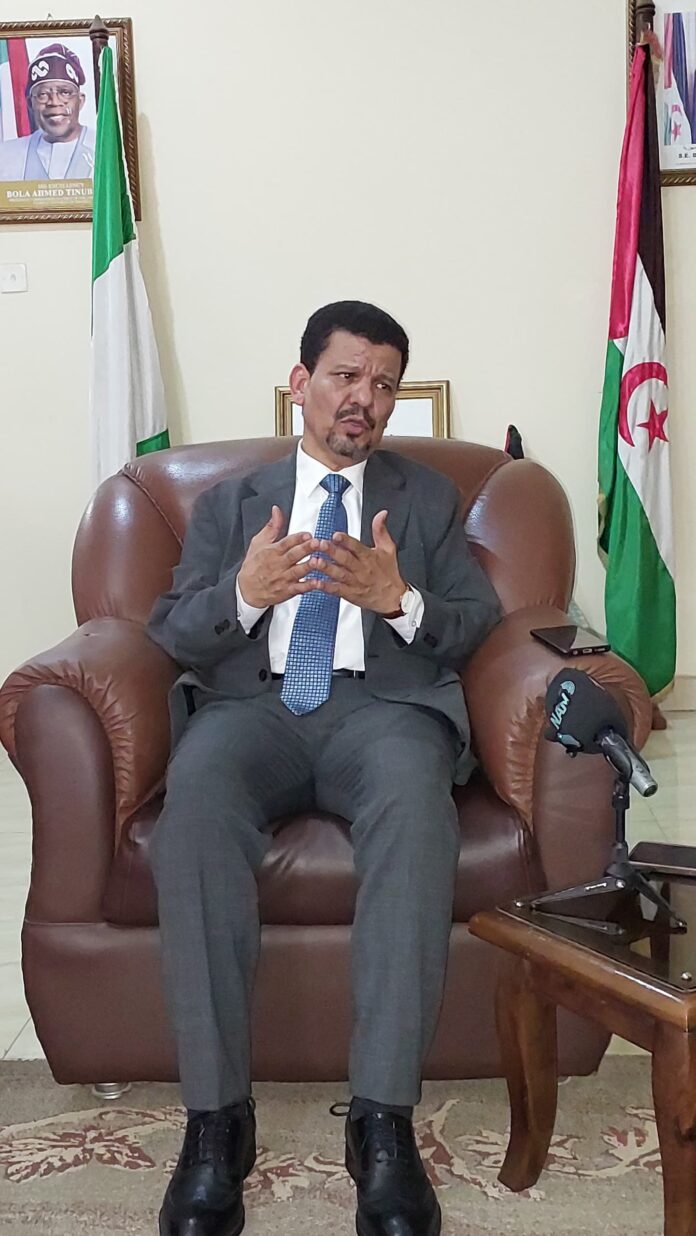By Joel Ajayi
The Minister of Foreign Relations and African Affairs of the Sahrawi Arab Democratic Republic (SADR), Mohamed Bessat, has called on the Nigerian government and the international community to support his country’s quest for self-determination and an end to Moroccan occupation of Western Sahara.
Speaking during an official visit to Nigeria, Bessat emphasized the deep historical and diplomatic ties between Nigeria and the Sahrawi Republic, expressing appreciation for Nigeria’s longstanding commitment to anti-colonial struggles across Africa.
“I am in Nigeria at the invitation of my brother and colleague, His Excellency, the Honourable Yusuf Tuggar, Nigeria’s Minister of Foreign Affairs,” Bessat stated. “This visit reflects the long-standing relationship of brotherhood, solidarity, and cooperation between the Federal Republic of Nigeria and the Sahrawi Arab Democratic Republic.”
He said the visit aims to brief Nigerian leaders, lawmakers, diplomats, and the general public about the ongoing struggle in Western Sahara, a region he described as under illegal Moroccan occupation since 1975.
Bessat traced the origins of the conflict to the 1975 Madrid Agreements, in which colonial Spain—then under dictator Francisco Franco—ceded control of Western Sahara to Morocco and Mauritania after withdrawing.
“That agreement was a betrayal and a theft of our territory,” Bessat said. “It triggered a long war. Although we have good relations with Mauritania today, Morocco continues to occupy nearly two-thirds of our land. We are engaged in both military and diplomatic resistance to this illegal and brutal occupation.”
According to him, a joint African Union-United Nations peace plan was signed in 1990, proposing a referendum to allow the Sahrawi people to choose between independence or integration with Morocco.
“Sadly, Morocco has sabotaged this process repeatedly—first with delays, then by refusing outright to cooperate,” he added.
Describing Nigeria as the “backbone” of Africa’s anti-colonial history, Bessat praised the country’s leadership role in the liberation of African nations from Portuguese, apartheid, and colonial rule.
“We are calling on our Nigerian brothers and sisters to continue this proud tradition and help us close the last chapter of decolonisation in Africa,” he said.
He expressed gratitude for the support already received from Nigerian political parties, parliamentarians, and the government, calling it “encouraging and deeply appreciated.”
Bessat said that since 2020, Morocco has violated a longstanding ceasefire and resumed aggressive military operations, leading to near-daily confrontations between Sahrawi and Moroccan forces.
“Morocco has not only expanded its occupation but also constructed more military walls within our territory,” he explained.
He also highlighted ongoing human rights violations and resource exploitation in the occupied territories, urging the international community to act decisively.
Western Sahara, he said, is one of the most resource-rich territories in the world, with petroleum, gas, gold, diamonds, iron, copper, uranium, and rare earth minerals.
“Our natural wealth should be a blessing, but instead it has fueled conflict. Morocco is plundering these resources, further deepening the crisis,” he said. “We are calling for cooperation, not conflict. Recognize our right to self-determination, and we can engage in partnerships for mutual benefit.”
Bessat concluded by appealing to the global community to uphold international law and support the Sahrawi people’s legitimate aspirations.
“The world is becoming increasingly unstable due to the erosion of international legality. It’s time for all nations—big or small—to commit to the rule of law. Supporting our cause is the fastest route to peace, African unity, and economic cooperation,” he stated.
“We urge the world to help end the human rights violations and economic plunder in Western Sahara and bring Africa’s last decolonisation battle to a close.”





